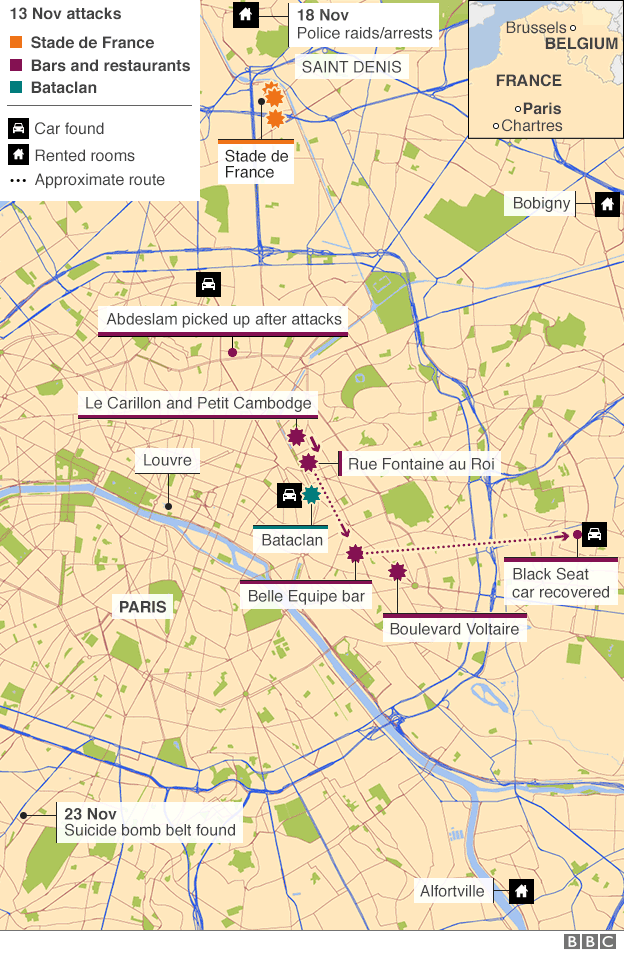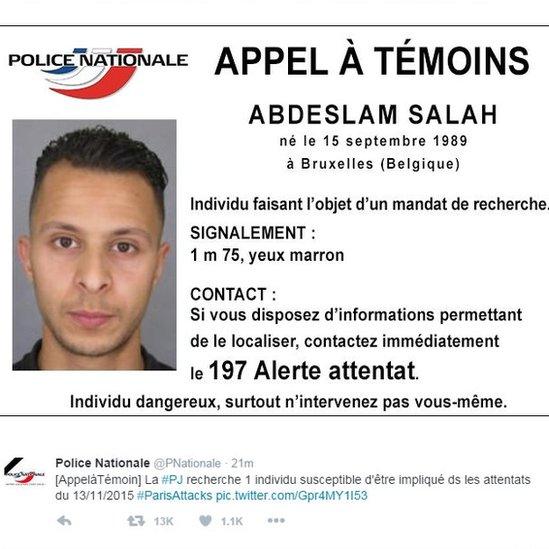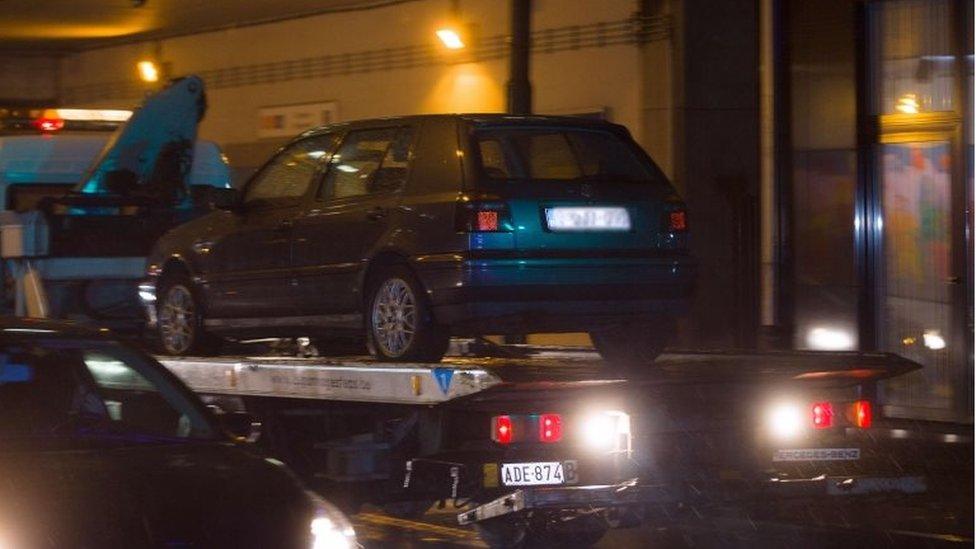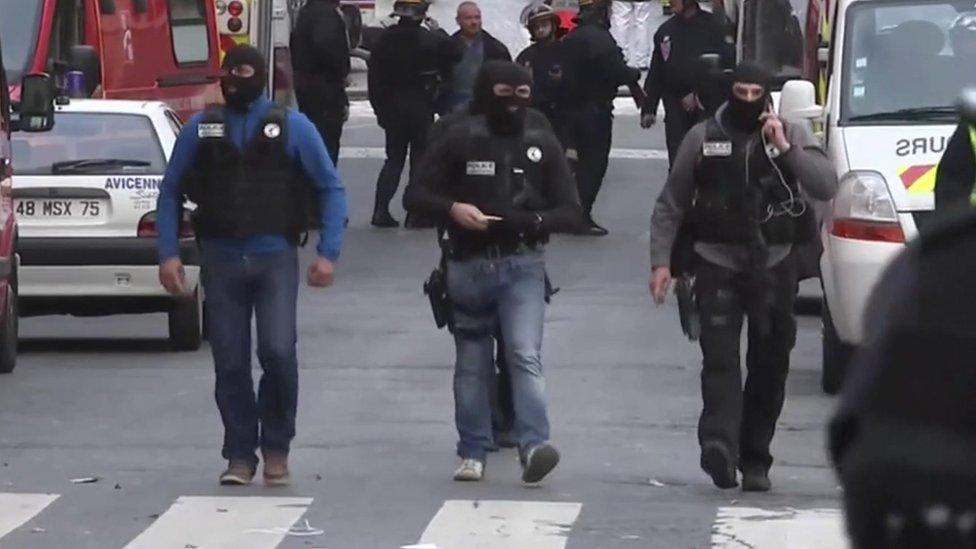Paris attacks: The investigation so far
- Published
How the attacks in Paris unfolded on 13 November 2015
As French and Belgian investigators continue to examine events surrounding the deadly attacks in Paris, what do we know about their findings to date?
How many attackers were there?
At least nine people are believed to have been directly involved in carrying out the attacks, all nine are now dead. A tenth suspect, Salah Abdeslam, is still on the run.
Seven of the suspects have been named; three more have yet to be identified by police.
French security services are investigating whether Salah Abdeslam may have been part of a planned fourth attack, which never took place, in the 18th district.
A suicide belt containing explosives was found in the Montrouge area of south-west Paris on 23 November, close to where the suspect was placed by mobile phone data on the night of the attacks.
The suspected organiser of the atrocities, Abdelhamid Abaaoud, was killed in a police raid in the Saint Denis area of Paris five days after the attacks.
The attackers appear to have worked in three co-ordinated teams using the same type of assault rifles, and wearing the same type of suicide vests, Paris prosecutor Francois Molins said.
Three attackers blew themselves up outside the Stade de France, north of central Paris
One attacker died after detonating his explosives at the Comptoir Voltaire cafe on the Boulevard Voltaire
Three men wearing suicide vests were involved in the deadliest attack of the night, at the Bataclan concert venue, in which 89 people were killed. Two of the gunmen died after detonating their vests; the third was shot by police
Mr Molins said a plan to launch another attack, by a fourth team of militants, may have been thwarted by the Saint Denis raids.
Three people died in a shootout, including Abdelhamid Abaaoud and his female cousin, Hasna Aitboulahcen.
It was initially believed she had detonated an explosives vest during the raid - but French officials later said that was not the case.
The identity of the third person has not been established.

What do we know about the attackers?
Bataclan:
Omar Ismail Mostefai was a 29-year-old French national of Algerian descent. He was known to police as a petty criminal and was identified in 2010 as a suspected Islamic radical. Since then, he appears to have been able to travel to Syria; he may have also spent time in Algeria. He blew himself up after the Bataclan massacre
Samy Amimour, a 28-year-old Frenchman, was charged with terror offences in 2012 over claims he had planned to go to Yemen. He was placed under judicial supervision, but then dropped off the radar. French media say he was with the Islamic State (IS) militant group in Syria last year and subsequently slipped back into France undetected. Amimour also blew himself up at the Bataclan
One other dead attacker, who has not yet been identified
Stade de France:
Bilal Hadfi was a 20-year-old French national who had lived in Brussels. Belgian prosecutors have said they were aware he had gone to fight with IS in Syria, but did not know he had returned. He blew himself up after being denied entry to the stadium
A man who travelled to Europe via Greece using a fake Syrian passport in the name of "Ahmad al-Mohammad". He may have been posing as a Syrian refugee. He was the first of three to blow himself up at Stade de France stadium
One other dead attacker identified by the BBC as M al-Mahmod. He blew himself up outside the stadium. He arrived on the Greek island of Leros on 3 October, travelling with Ahmad al-Mohammed
Bars and restaurants:
Brahim Abdeslam, 31, a Frenchman living in Brussels, blew himself up at the Comptoir Voltaire. He was known to Belgian police, having travelled to Turkey this year intending to go on to Syria and been deported by the Turks back to Brussels. He had a bar in the Molenbeek area of Brussels, later reportedly shut down by police because of drug-taking there
Abdelhamid Abaaoud, 28, described as the ringleader in the Paris attacks. Investigators believe he was involved in the bar and restaurant killings. His fingerprints were found on a Kalashnikov left in the Seat car abandoned in Montreuil. He grew up in the Brussels district of Molenbeek and was an associate of Salah Abdeslam
French media have said another, unidentified, attacker was also involved, but this has not been confirmed
4th attack?
Salah Abdeslam, 26, Brahim's younger brother, is still on the run, having escaped from Paris after the attacks. He is reported to have worked for a period on the Brussels tram system and to have spent time in prison with Abdelhamid Abaaoud. Locals said he was a regular consumer of alcohol and drugs at his brother's bar
Where is Salah Abdeslam now?
A massive manhunt for the suspected attacker is continuing. French officials have said they do not know if he is in France.
Police stopped his car three times in the hours after the attacks, on the last occasion near the Belgian border, but let him and his two fellow passengers go as they were not on a wanted list at the time.

Belgian police have been investigating reports of possible sightings. The car in which Salah Abdeslam was travelling has been found by police in Brussels and taken away.
The two men who were with Salah Abdeslam - Mohammed Amri, 27, and Hamza Attou, 20 or 21 - have been charged with terrorist offences. The three men are all from Molenbeek, which remains a focus for investigators.
A lawyer for one of the men charged said they had helped their friend unwittingly, having answered a call to go to Paris to pick him up.
What else are police investigating?
Movements of Abdelhamid Abaaoud
Investigators have yet to say how a militant they believed to be in Syria was able to return to France undetected. More immediately, they have been trying to establish his movements shortly before, during and after Friday's attacks.
French prosecutors have said Abaaoud was caught by CCTV footage at the Croix de Chavaux metro station in Paris on the night of the killings.
The images were captured at 22:14 local time in the station in the Montreuil area, less than an hour after gunmen opened fire on cafes and restaurants in the Canal St-Martin district and while other attacks were continuing.
The video places him near the black Seat car found in Montreuil later, which was hired by Brahim Abdeslam and believed to have been used in the attack on the restaurants.
Vehicles
Two cars known to have been used in the attacks have been a focus of police activity.
A black VW Polo - hired by Salah Abdeslam in Belgium and used by the Bataclan attackers - contained parking tickets issued in Molenbeek. It was reportedly these that first alerted French investigators to a link to that neighbourhood.
As well as the VW Polo and the Seat found abandoned in eastern Paris, a black Renault Clio was found parked in Paris's 18th arrondissement. It was registered in Belgium and rented under the name of Salah Abdeslam, French newspaper Liberation reported.
A fourth car, a VW Golf, has been taken away by Belgian investigators in Brussels.
This is the vehicle that Salah Abdeslam was travelling in when he crossed back into Belgium on Saturday morning.

This VW Golf was taken away by police in the Molenbeek district of Brussels
Accommodation
Police are known to have uncovered two places thought to have been used by the suspected assailants prior to the attacks.
Investigators searched a house in the Paris suburb of Bobigny that had been rented by one of the suicide bombers, but reportedly found little useful evidence.
Syringes were found in a hotel room thought to have been rented by Salah Abdeslam in the eastern suburb of Alfortville - visible in video published by French magazine Le Point, external.
Le Point speculates that they could have been used to make the explosives vests detonated by seven of the assailants, or to take drugs.
Information collected from tapped phone conversations, surveillance and witness accounts then led police to storm the building on Rue du Corbillon in Saint Denis in the hunt for Abdelhamid Abaaoud.
Abaaoud's brother
It has emerged that the younger brother of Abdelhamid Abaaoud was arrested last month in Morocco.
Yassine Abaaoud was detained after he arrived in his father's hometown of Agadir, Moroccan security sources said. He has been held in custody since then.
It is not clear if he has any connection to the Paris attacks and Moroccan police have given no details about why they have been holding him.

French police have been authorised to carry their firearms whether on or off duty
Other individuals in France
French police and gendarmes have continued to carry out raids looking for suspected associates of the attackers and other jihadists. From 15-20 November, there were 793 raids, resulting in 107 arrests, French Interior Minister Bernard Cazeneuve has said.
A further 164 people have been placed under house arrest.
It is unclear what links, if any, these people may have with the attackers.
On Saturday, French police freed seven out of the eight people arrested during the massive Saint Denis raid, prosecutors said according to AFP news agency.
However, Jawad Bendaoud - who has admitted lending the apartment to two people from Belgium "as a favour", but denied knowing any more - is still being held in custody.
More on the Belgian connection
The Belgian authorities have so far charged four people with involvement in the attacks.
Another man, a Belgian of Moroccan descent, Ahmad Dahmani, 26, has been arrested at a luxury hotel in Antalya, Turkey, along with two other suspects, Turkish authorities have told the BBC.
He is believed to have been in contact with the suspects who perpetrated the Paris attacks, an official said. He arrived in Turkey from Amsterdam on 14 November; there is no record of the Belgian authorities having warned Turkey about him, which is why he was not the subject of an entry ban, the official said.
Possible German connection
Police in Germany are questioning a 39-year-old Algerian man about possible links to the Paris attackers.
He is in custody in Arnsberg, near Dortmund, and has been living in a refugee reception centre.
Two Syrians there reported that he had spoken several days before the 13 November attacks about an act of violence coming to Paris.
A handwritten note was found behind the wardrobe in his room, saying: "Ali Baba 4, 13.11 Paris."
The man has told police he is innocent.
If the US can help
At least four of the Paris attackers were listed in a central counter-terrorism database maintained by the US intelligence community, US officials have told Reuters news agency.
At least one was also on a no-fly list, officials said.